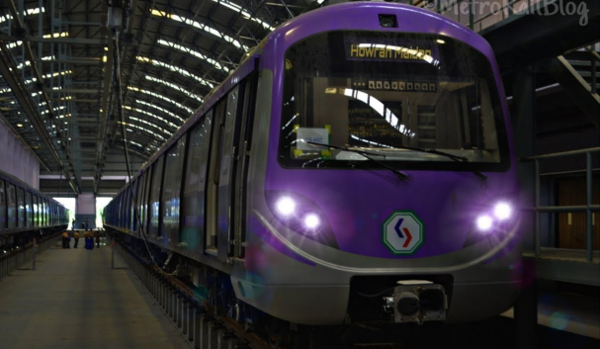Kolkata, India : The Kolkata Metro Rail Corporation (KMRC) has opened metro services on the first 5.8 km stretch of Kolkata East West-Metro corridor. Union Minister for Railways and Commerce Piyush Goyal has flagged off the first metro train from Sector V at 5.00 pm today. The commercial operation for the public will begin from tomorrow. This corridor is also known as the Country’s first underwater metro.
The 5.8 km long elevated stretch from Sector V to Salt Lake Stadium has a total of six numbers of stations namely Sector V, Karunamoyee, Central Park, City Centre, Bengal Chemical and Salt Lake Stadium.
The total length of the East-West Metro corridor from Sector V to Howrah Maidan is 16.55 km. The corridor comprises both elevated viaducts covering 5.77 km and an underground section of 10.81 km.
In a first in the country, tunnels have been bored under the Hooghly river to connect the twin cities of Kolkata and Howrah through the underwater metro rail system. The estimated cost of the entire East-West Metro corridor is Rs 8,574.98 crore. The remaining portion of the underground metro corridor is expected to be completed by 2021.
Kolkata Metro is India’s first and oldest metro rail project which is providing metro services to the people of Kolkata since 1984.
Here are some salient features about India’s first ‘underwater’ metro service:
- The East-West corridor of the Kolkata Metro Rail Project is 16.55 km long and will include a pair of 10.8-km long metro rail tunnels that run underground. The remaining 5.8 km is elevated.
- The underground tunnel will include a 520-m section that will run under the Hooghly river, which will be India’s first underwater tunnel.
- The underground tunnel will stretch from Phoolbagan station up to Howrah Maidan and will have a total of 6 stations including Phoobagan, Sealdah, Esplanade, Mahakaran, Howrah, and Howrah Maidan. The underground tunnel will cross the Hooghly river between Mahakaran and Howrah stations.
- After completion of the entire metro corridor, the new Metro line will be able to carry around close to a million people every day—that’s nearly a fifth of the population of Kolkata.
- The journey from Salt Lake to Howrah will be completed in 30 minutes against over an hour from other modes of transport. Even the river crossing, which can take 15 minutes by ferry and often 30 minutes by road, will now be crunched to just a minute.
- Phoolbagan metro station is the first of the six metro stations along the East-West corridor that is ready to function and will be inspected by the commissioner of railway safety at any time this month.
- The unique feature of this metro corridor is that the platform screen doors have been installed at all metro stations. The platform screen door will not only prevent accidental fall on tracks but also intentional fall. Inside the Kolkata Metro, there are lots of advanced passenger-friendly features like the real-time monitory, through which any information which has to be disseminated to the passengers can be done from the control room directly.
- An obstruction detection system has been introduced in this corridor to protect passengers.
- Around 2,100 passengers can travel at a time on the 6-coach metro trains deployed in the East-West corridor.
The inauguration ceremony was attended by Babul Supriyo, Union Minister of State for Environment, Forest and Climate Change; Sujit Bose, Minister for Fire and Emergency Services & Forest, Government of West Bengal; Dr. Kakoli Ghosh Dastidar, Member of Parliament (Lokasabha), Barasat; Dr. Sukanata Majumdar, Member of Parliament (Lokasabha); Krishna Chakraborty, Mayor, Bidhannangar Municipal Corporation, Manas Sarkar, Managing Director, Kolkata Metro Rail Corporation, Manoj Joshi, General Manager, Kolkata Metro Railway and other dignitaries.
Source: Urban Transport News
You may also like
-
Dot Simplifies Approval Processes For Telecom Licenses And Wireless Equipment
-
PM to Inaugurate SEMICON India 2024 on 11th September
-
Shri Piyush Goyal Sets 500 Million Tonnes Domestic Steel Production Target by 2034
-
NHAI to Track Around 100 Toll Plazas with GIS-Based Software for Seamless Movement of Traffic at National Highways
-
“Marching Towards Building A Digitally Connected Bharat and An Atmanirbhar Telecom Sector”: Union Minister Jyotiraditya Scindia
